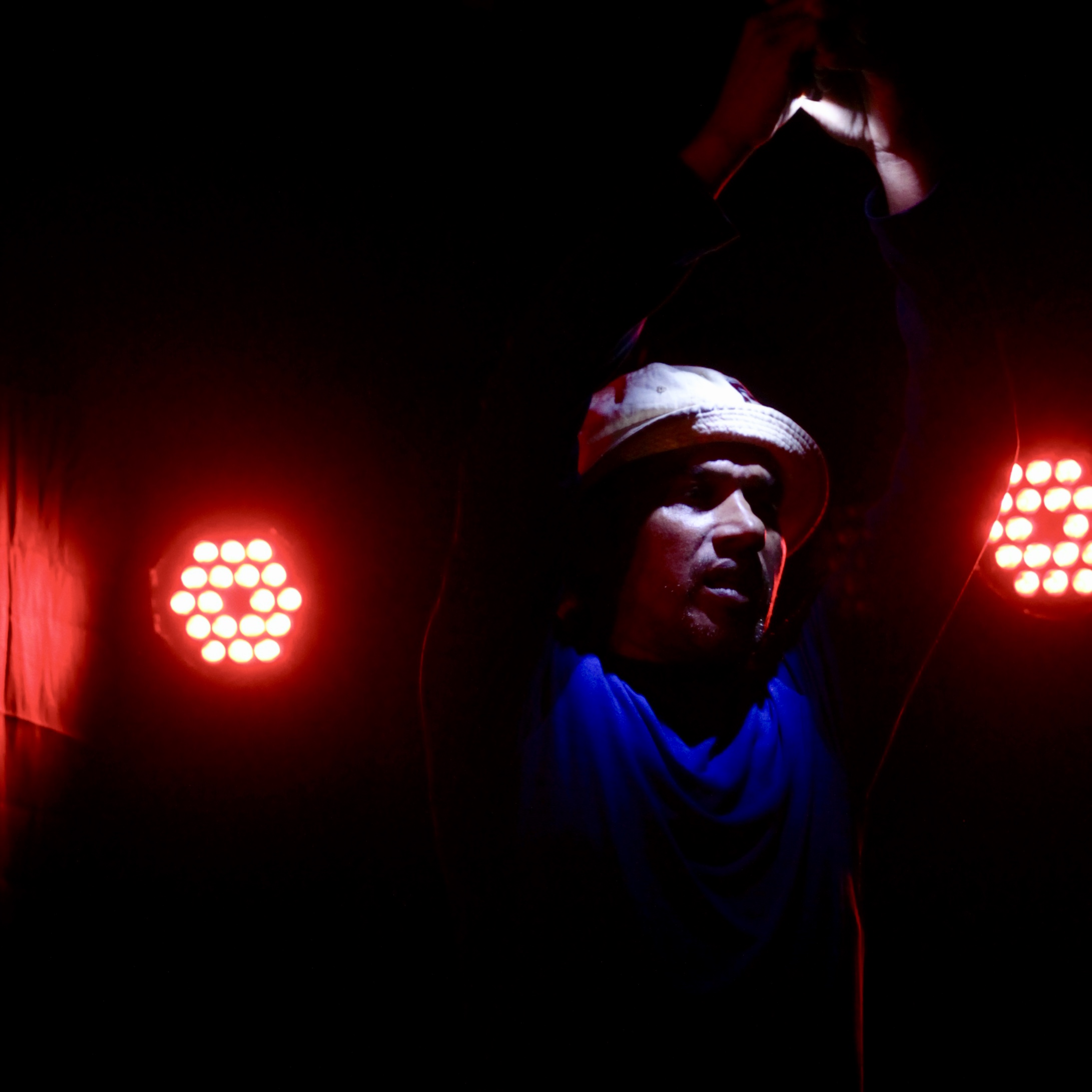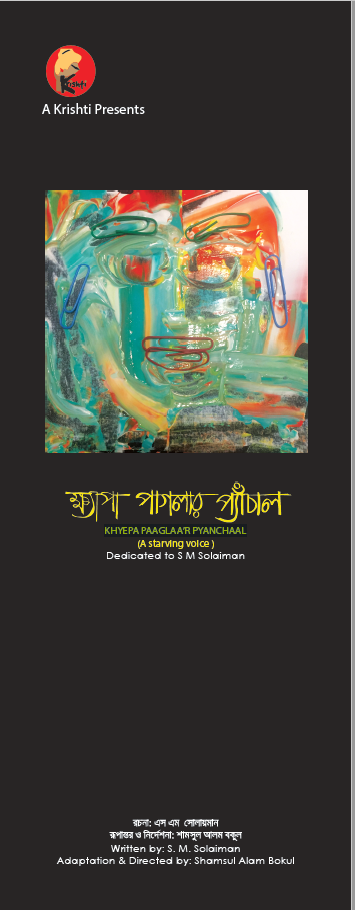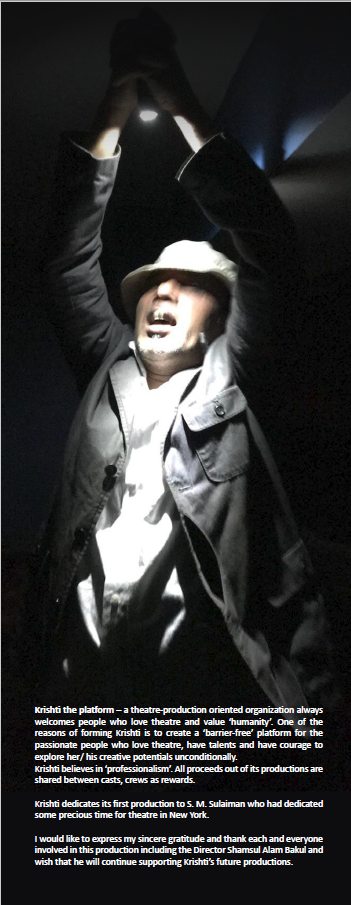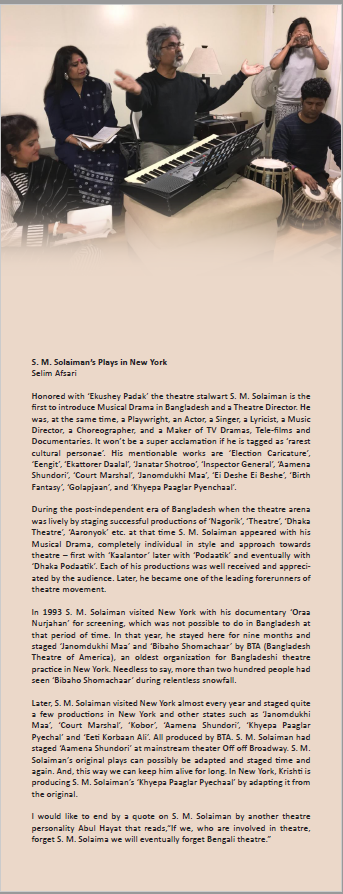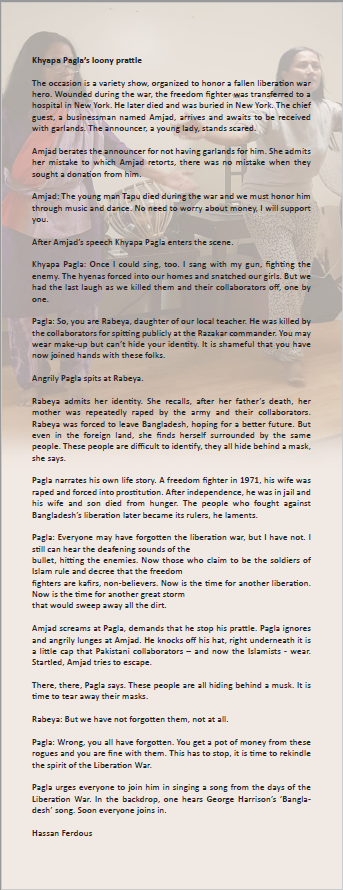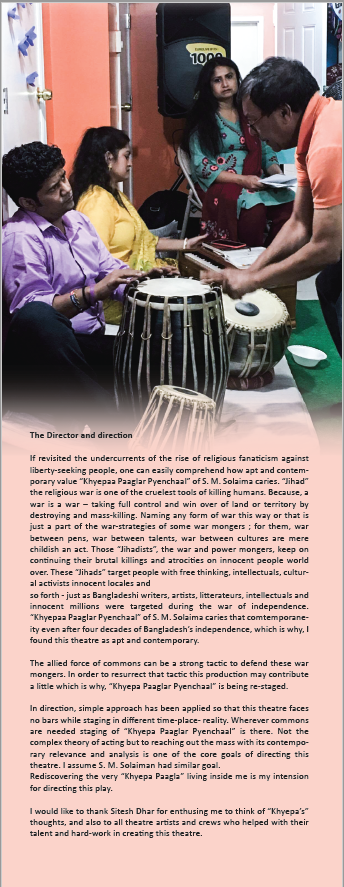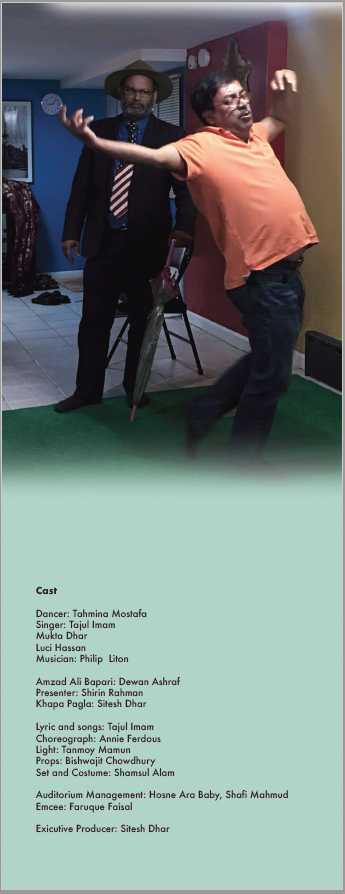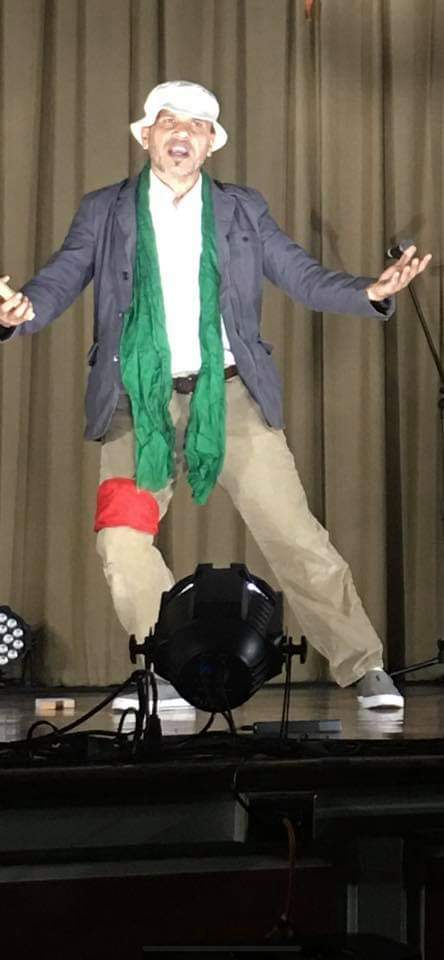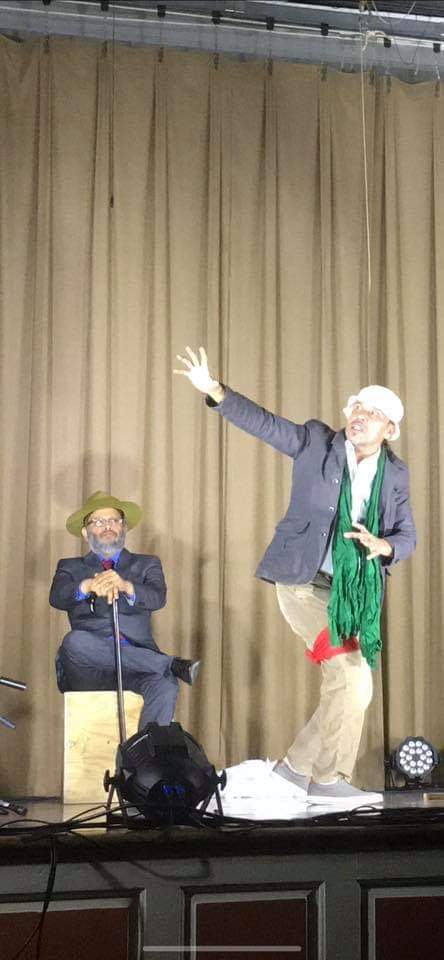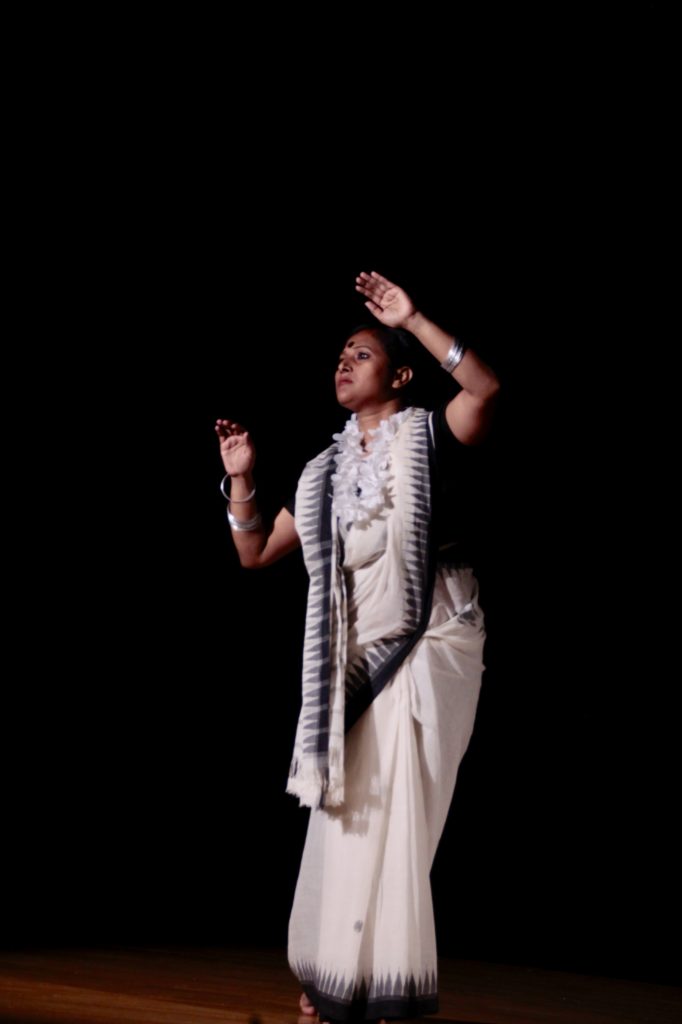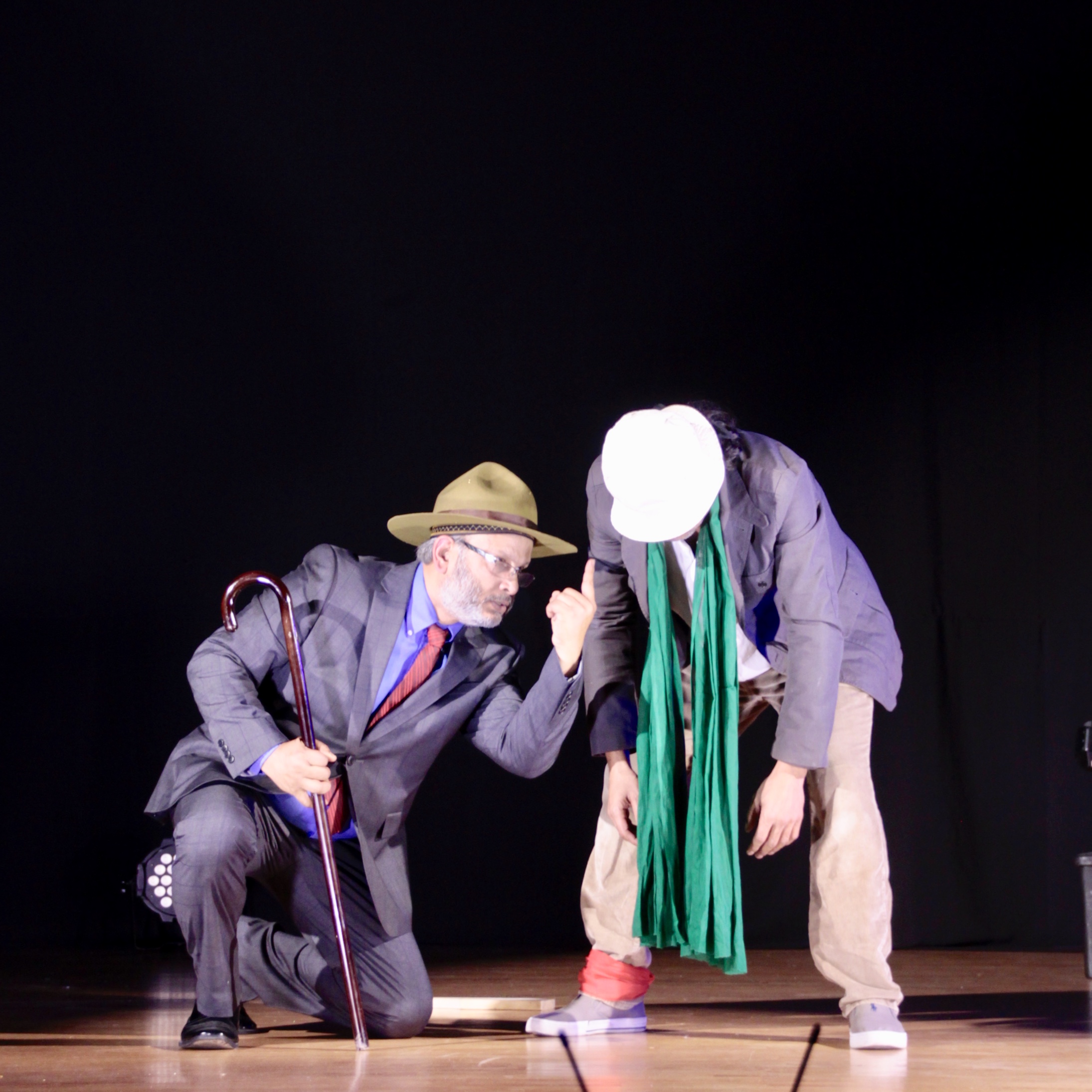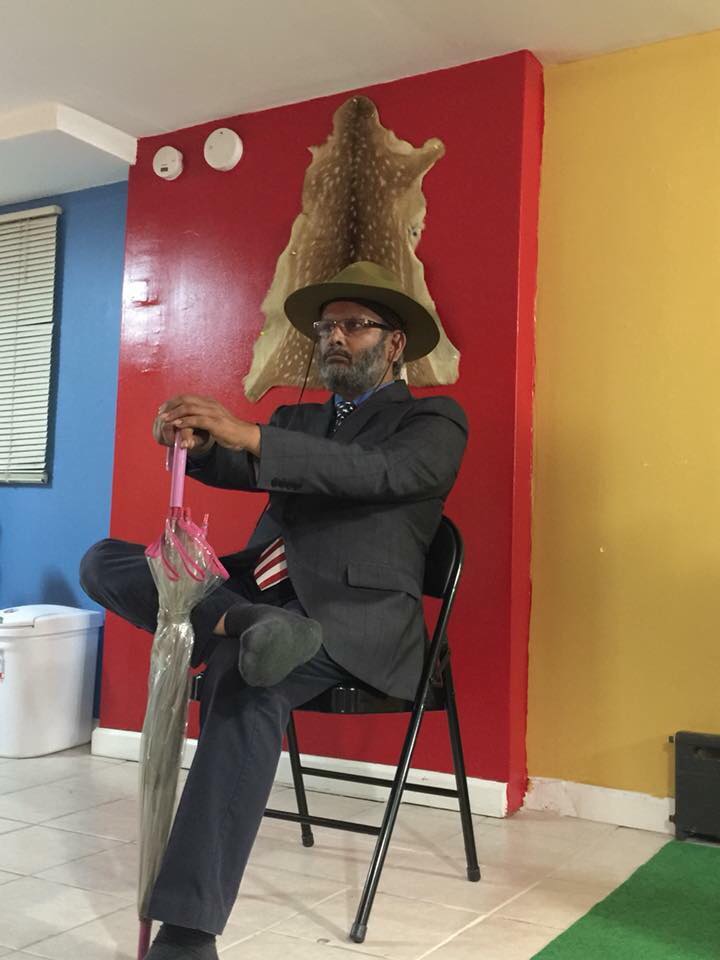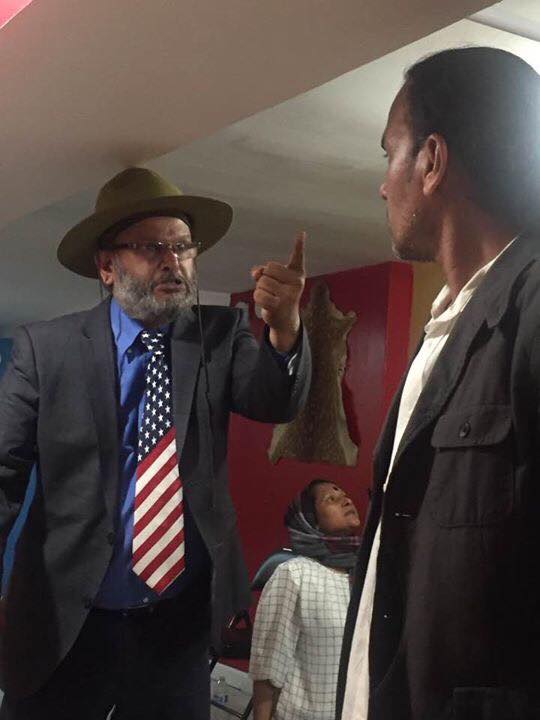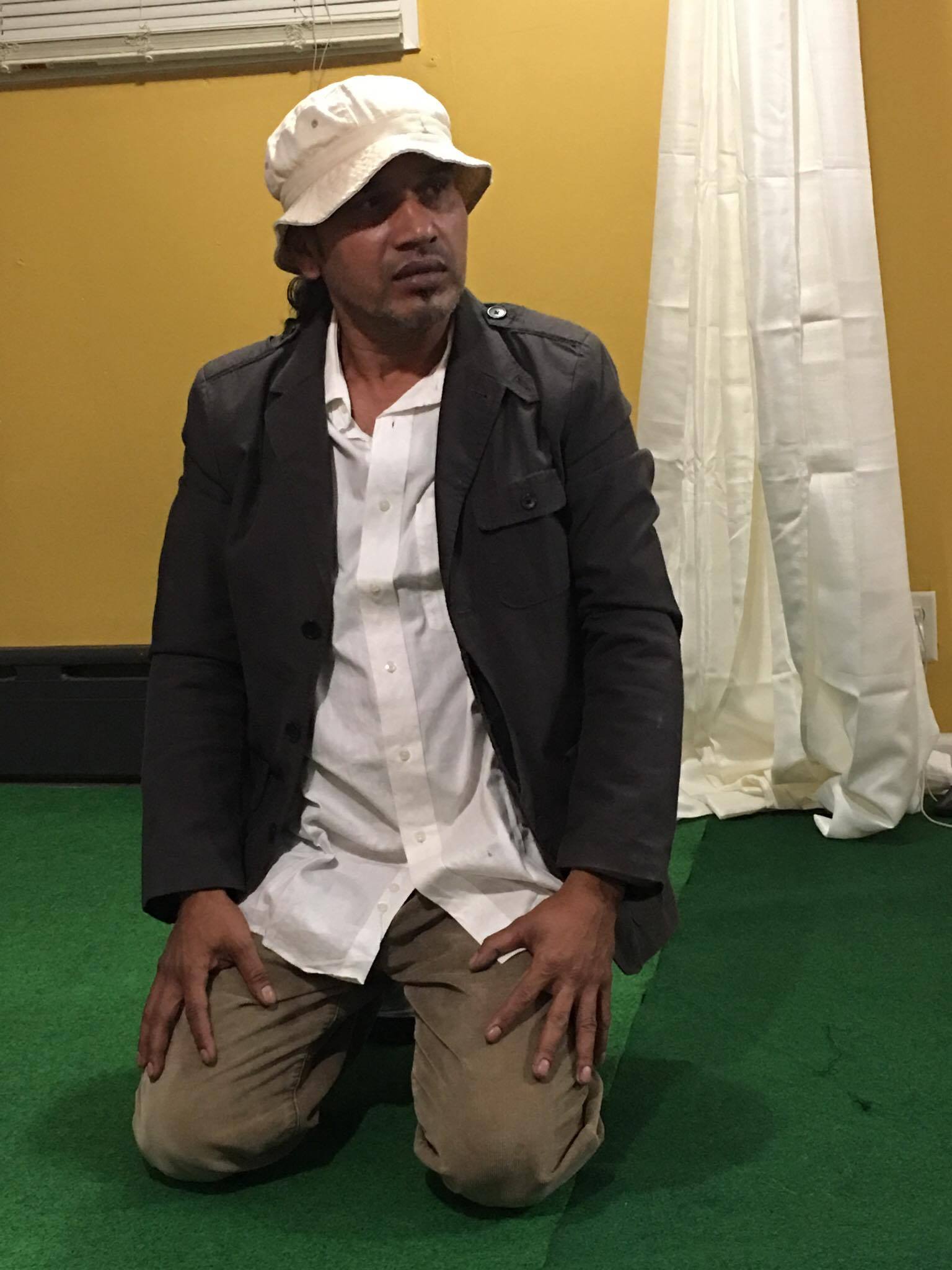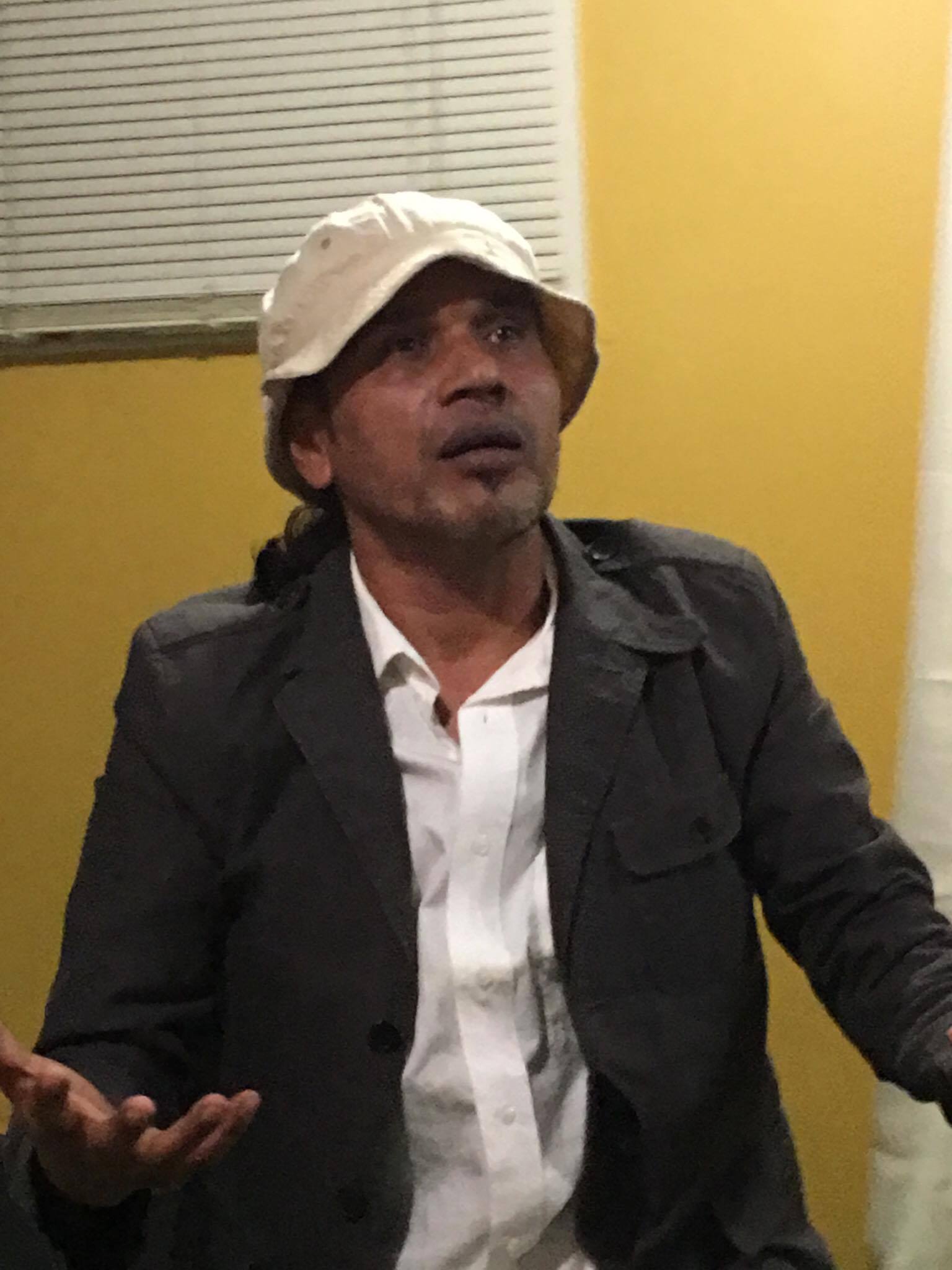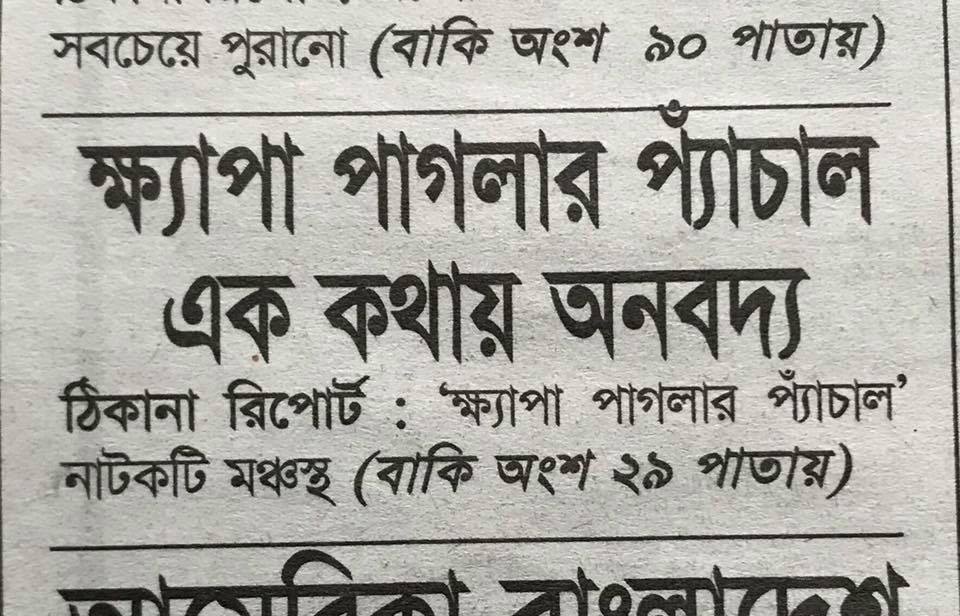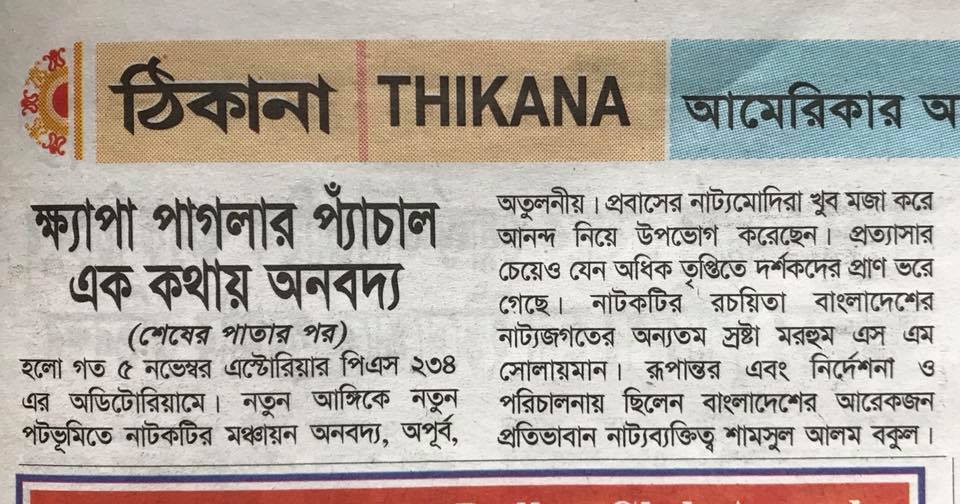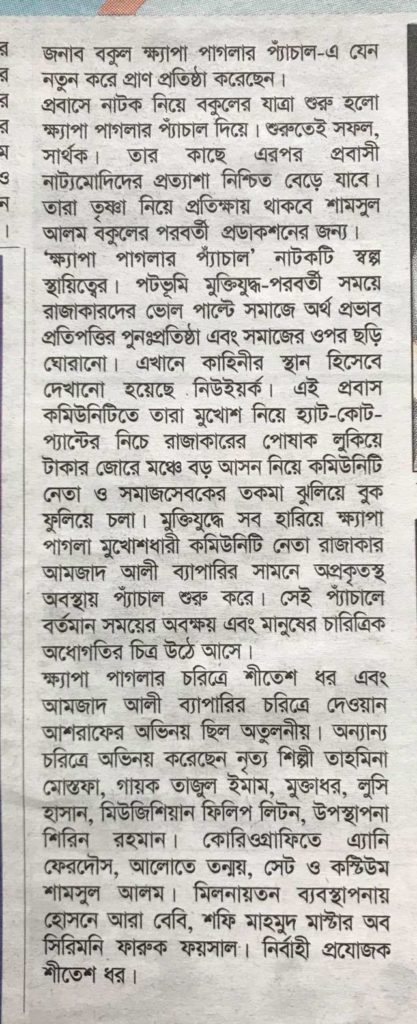KHYEPA PAAGLAA’R PYANCHAAL(A starving voice )
Khyepa Paaglaar Pyanchaal written by S.M.Solaiman one of the most staged drama in Bengali Theater history. In 1990s I have played different roles of this drama and staged several times in Bangladesh. in 2018 when I met one of the renowned actor and director shamsul Alam Bokul in New York, I managed him to agree to direct this play. I would like to mention that with the permission of another actor-director Rokeya Rafique.We have changed the place of the play from Bangladesh to New York. Which means it was different than original play. It was tremendous Journey playing as a leading role of this play. Also I would like to mention that in 2020 during the pandemic I had set up stage on my dining space and played a solo “web performance” of this play directed by shamsul Alam Bokul.
Dedicated to S M Solaiman
Krishti the platform – a theatre-production oriented organization always welcomes people who love theatre and value ‘humanity’. One of the reasons of forming Krishti is to create a ‘barrier-free’ platform for the passionate people who love theatre, have talents and have courage to explore her/ his creative potentials unconditionally.
Krishti believes in ‘professionalism’. All proceeds out of its productions are shared between casts, crews as rewards.
Krishti dedicates its first production to S. M. Sulaiman who had dedicated some precious time for theatre in New York.
I would like to express my sincere gratitude and thank each and everyone involved in this production including the Director Shamsul Alam Bakul and wish that he will continue supporting Krishti’s future productions.
S. M. Solaiman’s Plays in New York
Selim Afsari
Honored with ‘Ekushey Padak’ the theatre stalwart S. M. Solaiman is the first to introduce Musical Drama in Bangladesh and a Theatre Director. He was, at the same time, a Playwright, an Actor, a Singer, a Lyricist, a Music Director, a Choreographer, and a Maker of TV Dramas, Tele-films and Documentaries. It won’t be a super acclamation if he is tagged as ‘rarest cultural personae’. His mentionable works are ‘Election Caricature’, ‘Eengit’, ‘Ekattorer Daalal’, ‘Janatar Shotroo’, ‘Inspector General’, ‘Aamena Shundori’, ‘Court Marshal’, ‘Janomdukhi Maa’, ‘Ei Deshe Ei Beshe’, ‘Birth Fantasy’, ‘Golapjaan’, and ‘Khyepa Paaglar Pyenchaal’.
During the post-independent era of Bangladesh when the theatre arena was lively by staging successful productions of ‘Nagorik’, ‘Theatre’, ‘Dhaka Theatre’, ‘Aaronyok’ etc. at that time S. M. Solaiman appeared with his Musical Drama, completely individual in style and approach towards theatre – first with ‘Kaalantor’ later with ‘Podaatik’ and eventually with ‘Dhaka Podaatik’. Each of his productions was well received and appreci-ated by the audience. Later, he became one of the leading forerunners of theatre movement.
In 1993 S. M. Solaiman visited New York with his documentary ‘Oraa Nurjahan’ for screening, which was not possible to do in Bangladesh at that period of time. In that year, he stayed here for nine months and staged ‘Janomdukhi Maa’ and ‘Bibaho Shomachaar’ by BTA (Bangladesh Theatre of America), an oldest organization for Bangladeshi theatre practice in New York. Needless to say, more than two hundred people had seen ‘Bibaho Shomachaar’ during relentless snowfall.
Later, S. M. Solaiman visited New York almost every year and staged quite a few productions in New York and other states such as ‘Janomdukhi Maa’, ‘Court Marshal’, ‘Kobor’, ‘Aamena Shundori’, ‘Khyepa Paaglar Pyechal’ and ‘Eeti Korbaan Ali’. All produced by BTA. S. M. Solaiman had staged ‘Aamena Shundori’ at mainstream theater Off off Broadway. S. M. Solaiman’s original plays can possibly be adapted and staged time and again. And, this way we can keep him alive for long. In New York, Krishti is producing S. M. Solaiman’s ‘Khyepa Paaglar Pyechaal’ by adapting it from the original.
I would like to end by a quote on S. M. Solaiman by another theatre personality Abul Hayat that reads,“If we, who are involved in theatre, forget S. M. Solaima we will eventually forget Bengali theatre.”
Khyapa Pagla’s loony prattle
Hassan Ferdous
The occasion is a variety show, organized to honor a fallen liberation war hero. Wounded during the war, the freedom fighter was transferred to a hospital in New York. He later died and was buried in New York. The chief guest, a businessman named Amjad, arrives and awaits to be received with garlands. The announcer, a young lady, stands scared.
Amjad berates the announcer for not having garlands for him. She admits her mistake to which Amjad retorts, there was no mistake when they sought a donation from him.
Amjad: The young man Tapu died during the war and we must honor him through music and dance. No need to worry about money, I will support you.
After Amjad’s speech Khyapa Pagla enters the scene.
Khyapa Pagla: Once I could sing, too. I sang with my gun, fighting the enemy. The hyenas forced into our homes and snatched our girls. But we had the last laugh as we killed them and their collaborators off, one by one.
Pagla: So, you are Rabeya, daughter of our local teacher. He was killed by the collaborators for spitting publicly at the Razakar commander. You may wear make-up but can’t hide your identity. It is shameful that you have now joined hands with these folks.
Angrily Pagla spits at Rabeya.
Rabeya admits her identity. She recalls, after her father’s death, her mother was repeatedly raped by the army and their collaborators. Rabeya was forced to leave Bangladesh, hoping for a better future. But even in the foreign land, she finds herself surrounded by the same people. These people are difficult to identify, they all hide behind a mask, she says.
Pagla narrates his own life story. A freedom fighter in 1971, his wife was raped and forced into prostitution. After independence, he was in jail and his wife and son died from hunger. The people who fought against Bangladesh’s liberation later became its rulers, he laments.
Pagla: Everyone may have forgotten the liberation war, but I have not. I still can hear the deafening sounds of the
bullet, hitting the enemies. Now those who claim to be the soldiers of Islam rule and decree that the freedom
fighters are kafirs, non-believers. Now is the time for another liberation. Now is the time for another great storm
that would sweep away all the dirt.
Amjad screams at Pagla, demands that he stop his prattle. Pagla ignores and angrily lunges at Amjad. He knocks off his hat, right underneath it is a little cap that Pakistani collaborators – and now the Islamists – wear. Startled, Amjad tries to escape.
There, there, Pagla says. These people are all hiding behind a musk. It is time to tear away their masks.
Rabeya: But we have not forgotten them, not at all.
Pagla: Wrong, you all have forgotten. You get a pot of money from these rogues and you are fine with them. This has to stop, it is time to rekindle the spirit of the Liberation War.
Pagla urges everyone to join him in singing a song from the days of the Liberation War. In the backdrop, one hears George Harrison’s ‘Bangla-desh’ song. Soon everyone joins in.
The Director and direction
Shamsul Alam Bokul
If revisited the undercurrents of the rise of religious fanaticism against liberty-seeking people, one can easily comprehend how apt and contem-porary value “Khyepaa Paaglar Pyenchaal” of S. M. Solaima caries. “Jihad” the religious war is one of the cruelest tools of killing humans. Because, a war is a war – taking full control and win over of land or territory by destroying and mass-killing. Naming any form of war this way or that is just a part of the war-strategies of some war mongers ; for them, war between pens, war between talents, war between cultures are mere childish an act. Those “Jihadists”, the war and power mongers, keep on continuing their brutal killings and atrocities on innocent people world over. These “Jihads” target people with free thinking, intellectuals, cultur-al activists innocent locales and
so forth – just as Bangladeshi writers, artists, litterateurs, intellectuals and innocent millions were targeted during the war of independence. “Khyepaa Paaglar Pyenchaal” of S. M. Solaima caries that comtemporane-ity even after four decades of Bangladesh’s independence, which is why, I found this theatre as apt and contemporary.
The allied force of commons can be a strong tactic to defend these war mongers. In order to resurrect that tactic this production may contribute a little which is why, “Khyepa Paaglar Pyenchaal” is being re-staged.
In direction, simple approach has been applied so that this theatre faces no bars while staging in different time-place- reality. Wherever commons are needed staging of “Khyepa Paaglar Pyenchaal” is there. Not the complex theory of acting but to reaching out the mass with its contempo-rary relevance and analysis is one of the core goals of directing this theatre. I assume S. M. Solaiman had similar goal.
Rediscovering the very “Khyepa Paagla” living inside me is my intension for directing this play.
I would like to thank Sitesh Dhar for enthusing me to think of “Khyepa’s” thoughts, and also to all theatre artists and crews who helped with their talent and hard-work in creating this theatre.
Cast
Dancer: Tahmina Mostafa
Singer: Tajul Imam , Mukta Dhar ,Luci Hassan
Musician: Philip Liton
Amzad Ali Bapari: Dewan Ashraf
Presenter: Shirin Rahman
Khapa Pagla: Sitesh Dhar
Lyric and songs: Tajul Imam
Choreograph: Annie Ferdous
Light: Tanmoy Mamun
Props: Bishwajit Chowdhury
Set and Costume: Shamsul Alam
Auditorium Management: Hosne Ara Baby, Shafi Mahmud Emcee: Faruque Faisal
Exicutive Producer: Sitesh Dhar
